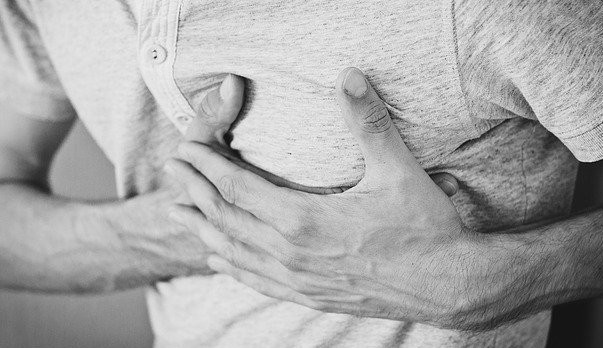Even if you think you are healthy, sometimes there are some early warning signs for a heart attack that you shouldn’t ignore. Let’s discuss some of them, as they could save your life.
You have always felt great and thought you were healthy, but you haven’t been feeling great since your wife’s birthday party dinner last week.
Funnily it is nothing that you can pinpoint exactly, you simply have some unexplained symptoms that have been going on and off for the past few days.
Here are some symptoms that you shouldn’t ignore, as they could be a sign of something more sinister, like an impending heart attack!
A study done by the National Institutes of Health (NIH) found that 95 % of women who’d had a heart attack reported experiencing symptoms in the weeks and months before the attack, but since the symptoms weren’t the normal expected chest pains, they went unrecognized.
Don’t ignore these six symptoms.
The Warning Signs For A Heart Attack

Indigestion And Nausea
One of the most overlooked signs of a heart attack is nausea and stomach pain.
Symptoms range from mild indigestion to cramping (mostly originating in the upper stomach area) and vomiting.
While not every stomach ache is a sign of an impending heart attack, it’s important to take note of any changes to your digestive habits.
If the pain arrives suddenly – and you haven’t eaten anything unusual or been exposed to a tummy bug then watch out.
A Pain In The Neck, Jaw, Ear Or Shoulder
We all know that a sharp pain and numbness in the chest, shoulder or arm could be a sign of a heart attack, but many people don’t experience heart attack pain this way at all.
Instead, they tend to feel pain in the neck or shoulder area or, in some cases, the pain travels along the jaw and up to the ear. But how do you determine whether it’s just a sore muscle or a sign of something more sinister?
One telltale sign is that the pain comes and goes, rather than persisting without relief like a pulled muscle does. Indeed, this is the most dangerous thing about this symptom. Since the pain comes and goes, it’s easy to overlook and difficult to pinpoint. If you notice pain that seems to move or radiate upwards and out, don’t delay, rather go and see your doctor immediately.
Sexual Dysfunction
For men, having trouble achieving (or keeping) erections is a common sign of coronary artery disease, but most men simply don’t make this connection.
A recent study of European men who were treated for cardiovascular disease found that two out of three men suffered from erectile dysfunction before they were diagnosed with heart trouble.
Swollen Legs
When your heart isn’t working properly, your blood can’t carry waste products away from your tissues. The result is oedema or swelling caused by fluid retention.
Since your feet, ankles and legs are the furthest from your heart and the place were poor circulation most often occurs, this is usually where edema sets in first.
Always tell your doctor if you notice unusual swelling and pain in these regions.
Exhaustion or Fatigue
More than 70 % of women in the study reported extreme fatigue in the weeks or months prior to their heart attack (and this affects men too). I’m not talking about the kind of tiredness you can power through with the help of a Red Bull or a strong shot of espresso. This is the type of fatigue that renders you incapable of getting out of bed.
If you’re usually an energetic person and suddenly find yourself crippled with exhaustion, call your doctor.
Insomnia

Many heart attack survivors remember experiencing a sudden, unexplained inability to fall asleep or stay asleep in the weeks leading up to their heart attack.
They also admit to feeling tightly wound – lying in bed, thoughts (and sometimes heart) racing. If you don’t ordinarily have trouble sleeping and begin to experience acute insomnia and anxiety for unexplained reasons, speak to your doctor.
So, What If I Have A Heart Attack?
Call an ambulance and get some aspirin into your system immediately. Your body will absorb the medication faster if you chew it, rather than swallow the tablet whole.) Most heart attacks develop when cholesterol-laden plaque in a coronary artery ruptures forming a clot.
Aspirin helps prevent this from happening. If you’re on your own, unlock your front door and gate while you’re still conscious. The time paramedics waste trying to get into your house could be crucial to your survival.
Trust that this article will help when it comes to warning signs for a heart attack so that you can be prepared in the future.
![]()

Thank you so much for writing this article. It is full of useful information. I will share it with all my friends, I think that everybody should read this.
I have watched an interview yesterday from a concerned doctor, that said that there is an increasing number of people who die from heart attacks because they are afraid to come to them because of the COVID-19. I think this article will help people recognize their symptoms earlier and maybe take them more seriously.
I am so glad I stumbled across your page, I did not know about all the warning signs. I only knew about swollen legs. So this was an eye-opening post.
Have a beautiful day, I will follow your work.
Katja
Thank you for your kind words Katja and hope this article just brings awareness to how suddenly a heart attack can happen and what one can watch out for.
Wow! I never knew any of these 6 could be a sign of a heart attack! The pain in the neck or shoulder, is this after doing something strenuous like exercise or does it just appear in the neck/shoulder? I have some shoulder pain after leaning on it or driving for like an hour. Is this normal or should I be worried?
Juliet, it is only shoulder or neck pain that comes and goes without warning, not because of overuse, so I don’t think you need to worry about that.
I am no doctor though, so the purpose of this article is just to make people more vigilant, and to go to the doctor if things don’t feel right.
I had to raise my eyebrows to the part where sexual dysfunction is a signor symptom that heart attack is on the way. i have really learnt a lot today. even swollen legs. although i do think that it depends of the mode by which the leg got swollen. thank you for this awesome post.
Thanks for stopping by, and yes although these can be symptoms, it doesn’t necessarily mean you are going to have a heart attack if you experience some of them, as something else could also be wrong.